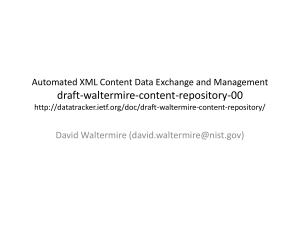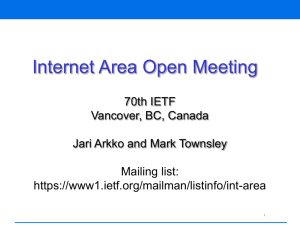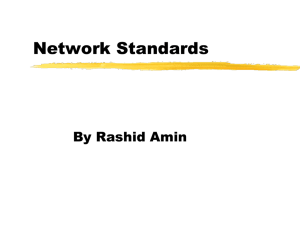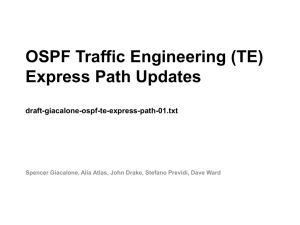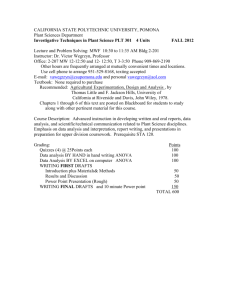Document 11736382
advertisement
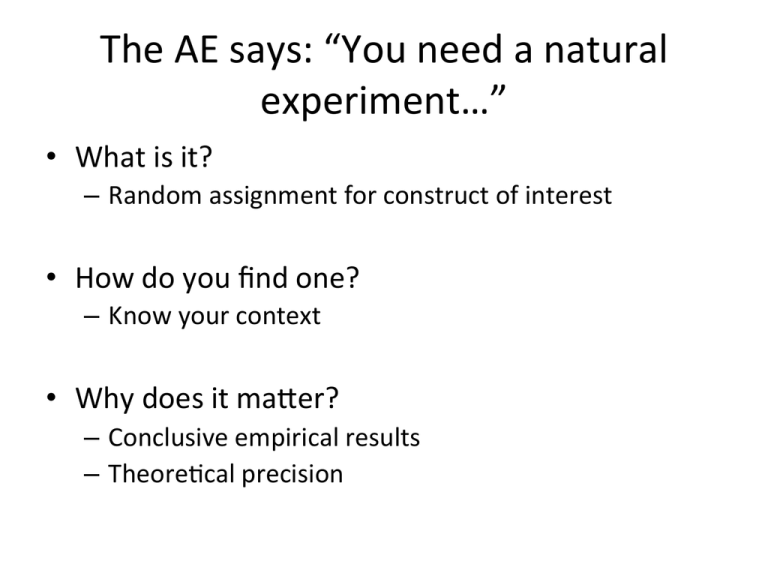
The AE says: “You need a natural experiment…” • What is it? – Random assignment for construct of interest • How do you find one? – Know your context • Why does it maDer? – Conclusive empirical results – TheoreGcal precision Status, Quality, and ADenGon: What’s in a (Missing) Name? Management Science 57(2), pp. 274–290 Tim Simcoe, Boston U. and NBER David Waguespack, U. of Maryland Status and Performance • Theory: Social Signals maDer for exchange when quality is uncertain • CumulaGve advantages for the well posiGoned via aDenGon and resources • Typical esGmaGon approach: regress observed posiGon plus controls on performance • IdenGficaGon Problems: omiDed variables (quality), reverse causaGon • SoluGon: disentangle status and signal – Merton 1968: “Rayleigh’s name was either omiDed or accidentally detached [from a manuscript] and the CommiDee turned it down as the work of one of those curious persons called paradoxers. However, when the authorship was discovered, the paper was found to have merits aeer all.” The Internet Engineering Task Force (IETF) • The de facto Internet standards body • Public data: 90K proposals, 3.5K publicaGons, 7K authors, 800K listserv messages, 7.5K leadership appointments, 60K conference aDendees over ~20 years. • • • • Authors submit manuscripts IETF posts and announces the manuscript Non-­‐blind community review Revise, quit, or gets published • “Et al” natural experiment – from 2000 to 2003 some prominent author names replaced with “et al” on email announcements Email Announcement * To: IETF-­‐Announce: ; * Subject: I-­‐D ACTION:draft-­‐duf<ield-­‐framework-­‐papame-­‐00.txt * From: Internet-­‐Drafts@ietf.org * Date: Mon, 19 Nov 2001 08:33:38 -­‐0500 * Reply-­‐to: Internet-­‐Drafts@ietf.org * Sender: nsyracus@cnri.reston.va.us A New Internet-­‐Draft is available from the on-­‐line Internet-­‐Drafts directories. Title: A Framework for Passive Packet Measurement Author(s): R. Bush, N. Duf<ield, A. Greenberg,M. Grossglauser, J. Rexford Filename: draft-­‐duf<ield-­‐framework-­‐papame-­‐00.txt Pages: Date: 16-­‐Nov-­‐01 A wide range of traf<ic engineering and troubleshooting tasks rely on reliable, timely, and detailed traf<ic measurements. We describe a passive packet measurement framework that is (a) general enough to serve as the basis for a wide range of operational tasks, and (b) relies on a small set of primitives that facilitate uniform deployment in router interfaces or dedicated measurement devices, even at very high speeds. This document describes the motivation for such a framework through several operational examples, de<ines the measurement primitives (<iltering, sampling, and hashing), and illustrates their use. A URL for this Internet-­‐Draft is: http://www.ietf.org/internet-­‐drafts/draft-­‐duf<ield-­‐framework-­‐ papame-­‐00.txt Drae INTERNET-­‐DRAFT draft-­‐duf<ield-­‐framework-­‐papame-­‐00 Randy Bush Nicholas G. Duf<ield Albert Greenberg Nov 14, 2001 Matthias Grossglauser Jennifer Rexford AT&T Labs -­‐ Research A Framework for Passive Packet Measurement Abstract A wide range of traf<ic engineering and troubleshooting tasks rely on reliable, timely, and detailed traf<ic measurements. We describe a passive packet measurement framework that is (a) general enough to serve as the basis for a wide range of operational tasks, and (b) relies on a small set of primitives that facilitate uniform deployment in router interfaces or dedicated measurement devices, even at very high speeds. This document describes the motivation for such a framework through several operational examples, de<ines the measurement primitives (<iltering, sampling, and hashing), and illustrates their use. Email Announcement * To: IETF-­‐Announce: ; * Subject: I-­‐D ACTION:draft-­‐zelig-­‐pw-­‐mib-­‐00.txt * From: Internet-­‐Drafts@ietf.org * Date: Fri, 13 Jul 2001 06:54:42 -­‐0400 * Reply-­‐to: Internet-­‐Drafts@ietf.org * Sender: nsyracus@cnri.reston.va.us A New Internet-­‐Draft is available from the on-­‐line Internet-­‐Drafts directories. Title: Pseudo Wire (PW) Management Information Base Using SMIv2 Author(s): D. Zelig et al. Filename: draft-­‐zelig-­‐pw-­‐mib-­‐00.txt Pages: 58 Date: 12-­‐Jul-­‐01 This memo de<ines an experimental portion of the Management Information Base (MIB) for use with network management protocols in the Internet community. In particular, it describes managed objects for modeling of Pseudo Wire (PW) services on a general Packet Switched Net (PSN). In addition, the current revision of the draft describes MIB module for PW operation over Multi-­‐Protocol Label Switching (MPLS) [MPLSArch] Label Switch Router (LSR). Future revisions will include other types of PSN, for example L2TP, GRE, etc. A URL for this Internet-­‐Draft is: http://www.ietf.org/internet-­‐drafts/draft-­‐zelig-­‐pw-­‐mib-­‐00.txt Drae Internet Draft David Zelig Expires: January 2002 Sharon Mantin Corrigent Systems Thomas D. Nadeau Cisco Systems, Inc. Dave Danenberg Litch<ield Communications, Inc. A. Malis Vivace Networks, Inc. July 2001 Pseudo Wire (PW) Management Information Base Using SMIv2 This memo de<ines an experimental portion of the Management Information Base (MIB) for use with network management protocols in the Internet community. In particular, it describes managed objects for modeling of Pseudo Wire (PW) services on a general Packet Switched Net (PSN). In addition, the current revision of the draft describes MIB module for PW operation over Multi-­‐Protocol Label Switching (MPLS) [MPLSArch] Label Switch Router (LSR). Future revisions will include other types of PSN, for example L2TP, GRE, etc. 0 New Submissions 500 1,000 1,500 Internet Drae Submissions 1992 1993 1994 1995 1996 1997 1998 1999 2000 2001 2002 2003 2004 Individual Working Group 1Jan2000 0 .0002 .0004 .2 .4 Et Al Probability Density .0006 .0008 .6 .001 .8 .0012 Q: When is Darlene really busy? 1Jul2001 ID Submissions 1Jan2003 1Jul2004 Et Al Probability 0 .2 Et Al Probability .4 .6 .8 A: Just before an IETF MeeGng 1Jan2000 1Jul2001 1Jan2003 1Jul2004 PublicaGon Decision on 5418 Manuscripts submiDed 2000-­‐2003. ~80 new or revised per week. High Status posiGon = WG Chair High Status Signal Sample split into two groups: 1) High uncertainty: publicaGon rate = 07% 2) Low uncertainty: publicaGon rate = 44% Name Signal maDers when uncertainty high Signal point esGmate not sensiGve to control variables Large status posiGon effect, but no signaling effect when uncertainty is low Status posiGon point esGmates very sensiGve to controls Conclusions • Juliet (but not Shakespeare) was wrong… – “A rose by any other name would smell as sweet” • MaDhew Effects at the IETF – Individual vs. Working Group submissions • Volume + heterogeneity => screening heurisGcs – ADenGon and increasing returns • Name-­‐based signals effect intermediate outcomes Natural Experiment: ADribuGon in IETF publishing • What is it? – Random assignment of author name visibility by Darlene Caveat: can’t be certain you will find a NE and can’t prove randomness • How do you find one? – Know your context: IETF processes • Why does it maDer? – Conclusive empirical results: status maDers for performance – TheoreGcal precision: signal and posiGon are funcGonally disGnct, but reinforcing Great news!: thinking experimentally will improve methods and theory… even if no NE found
